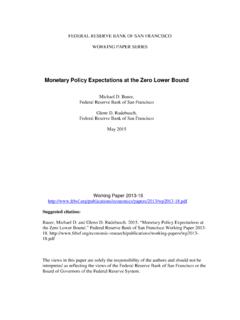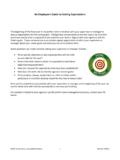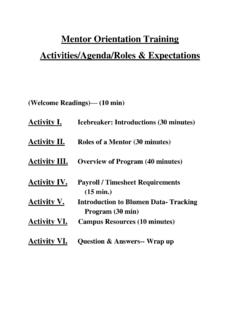Transcription of Studying Great Expectations - universalteacher.org.uk
1 Studying Great Expectations Andrew Moore Studying Great Expectations Copyright: Andrew Moore, 2001 ~armoore1955 2 Introduction This study-guide is written to help you study Great Expectations . It is suitable for students taking exam courses in English and English literature at Advanced (AS and A2) level in the UK, and may be helpful to able students taking GCSE courses. 1. To succeed on such courses, you need to understand the novel and, one hopes, enjoy it. You are not required to memorize the narrative, but you should know it well. Parents and teachers often encourage you to read classic texts, on the ground that they are good for you . This is not likely to tear you away from your television. You may also notice that your parents and teachers do not themselves spend hours in the company of Dickens or Shakespeare.
2 ( If it's so good, why don't you read it, dad? ) So what are classics and why are they worth Studying ? Telling stories In all ages and countries, some kind of story telling seems to have been popular. What varies is the form of the stories. In ancient Greece or mediaeval England, long poems were written to tell stories; in Athens in the 5th century and in 16th century England the popular form was plays. No one wrote novels before the last years of the 17th century, and the novel only became the most popular form in the 19th century, as more people learned to read; in our own time the feature film and television drama have become popular forms for narratives. One reason why certain of these stories are called classics is their popularity. In his time, Shakespeare's plays packed the theatres, in a way no other playwright could match.
3 More surprisingly, they have continued to attract large audiences to this day. Dickens, in the 19th century, published his novels, and those of other writers, as episodes in magazines; this meant lots of people could afford to buy them. It also meant that those who liked the story, and could afford to, would buy the complete book when this was published later. For those who could not read, or could not read well, there were public readings; Dickens performed extracts from his works to large and enthusiastic audiences. But is it still any good? Make up your own mind. Some things are thought to be good because they are fashionable. Some of the most popular books of the past are never touched today (mercifully). Where books remain popular over long periods of time, there is probably a good reason for this.
4 Dickens is still widely read, although not all his stories and novels are popular. Oliver Twist and A Christmas Carol are far better known today than Martin Chuzzlewit and Barnaby Rudge. Great Expectations is unusual because it is considered by leading scholars to be a work of genius, but is also very widely-read by ordinary people. Studying Great Expectations Copyright: Andrew Moore, 2001 3 Dickens is boring Studying any work at school or for an exam can make it seem boring. In the future when Coronation Street is studied for exams, some students will complain. Dickens uses language we find off-putting: his vocabulary often seems unfamiliar to modern readers, and his sentences often long and complex. Dickens is a Great lover of verbal irony: he uses words in such a way that he seems to be saying the opposite of what he really means; he expects the reader to understand this from the tone or the details of what he is saying.
5 Dickens also loves caricature: the peculiarities of his characters are often amplified for comic purposes; if we do not understand this, we will miss much of his humour. At a deep level, Dickens is very serious about his subjects, but on the surface, he is often ironical, sarcastic or whimsical. What is good about Dickens is his all-round strength: there is a huge range of characters, all well-drawn; places and other details are described vividly where necessary to the story and omitted where irrelevant; dialogue is lively and varied (though prone to comic exaggeration); mood and atmosphere are convincingly conveyed, while the plotting of the novels is faultless. Ways into Great Expectations Once you have read through the novel (you may need published notes to help you, but these may slow you down, and you should read as quickly as you can), you should identify subjects for study.
6 We can arrange these in categories. One would be characters and their relationships. In this novel many of the characters are best considered in pairs, as they resemble or are mirror images of others. Try and arrange them into pairs or small groups. Another category is themes. Themes are important ideas, which recur through the novel; often they are connected with particular characters. What, in your view, are the important ideas in this novel? The third category is perhaps the hardest of the three to consider: this is the author's technique, how the story is told. Technique includes: the plot and structure; the style of narrative and dialogue; the viewpoint of the narrative; symbolism and imagery, and other decorative or poetic features. Studying Great Expectations Copyright: Andrew Moore, 2001 4 You will see from this, that there are special words used for writing about literature.
7 The best critical writing is simple and natural; in your work, you should not try to write complex or long-winded commentaries. But certain key words (like plot or symbolism) cannot be avoided, as they are the only standard names for the ideas they express. You should always ask your teacher to explain any such words that you do not understand. You can't learn maths, science or music by guessing what words stand for what ideas, and the same is true of the study of literature! What examiners hate most is anything that looks like retelling of the story, without comment. On the other hand selected details from the story may be written about, so long as they are used to support your comment. In fact, interpretation of the text must be supported by evidence. Where possible, you should give the chapter number from which the evidence is taken.
8 Do not write at Great length about the first few chapters of any novel, and then leave out reference to the later parts of the novel. You must show that you know your way around the whole of any novel. Studying Great Expectations Copyright: Andrew Moore, 2001 5 A plan of the novel Here is a plan of the novel. The numbers are those of the chapters. The plan shows events and lists details. If you have not read the novel, it will make no sense. If you have read it, or as you are reading it, the plan will help you form a sense of the whole narrative structure. Part 1 1. Christmas Eve, afternoon: Pip meets the convict (Abel Magwitch); Pip asked to steal file and wittles 2. Joe and Mrs. Joe introduced; guns signal escaped convicts; Pip steals food 3. Christmas Day: Pip at the Battery; tells Magwitch of the young man (Compeyson) 4. Christmas Dinner we meet Pumblechook, Wopsle, the Hubbles; Pip said to be naterally wicious ; tar-water; the sergeant 5.
9 The soldiers; Magwitch and Compeyson; Magwitch confesses to Pip's crime; the Hulks 6. Pip's guilt; Pumblechook describes Magwitch's theft 7. Pip's education (from Biddy); Joe's lack of learning; Miss Havisham wants Pip to visit; Pip goes to stay with Uncle 8. Pip sees Estella, Miss Havisham at Satis House; twenty to nine; Estella seen as a star ; Pip calls knaves, Jacks 9. Pip's lies about Satis; Pumblechook pretends to know; Pip tells Joe the truth; first link of long chain 10. The stranger in the Three Jolly Bargemen; the file and the two one-pound notes (see Chapter 28 for the sequel) 11. Miss Havisham's birthday; Sarah Pocket, Camilla, Raymond condemn Matthew; Pip sees Jaggers; fights Herbert 12. More guilt; Pumblechook's hypocrisy; Pip to be apprenticed - Mrs. Joe slighted not to see Miss Havisham 13.
10 Joe at Satis House given twenty-five guineas; Pip bound apprentice; dinner at the Blue Boar 14. Reflection on Pip's shame and ingratitude; Joe's virtues described 15. The half-holiday: Joe fights Dolge Orlick, Pip visits Miss Havisham, Estella abroad; Mrs. Joe assaulted 16. Pip's guilt at the weapon (the leg-iron); Biddy moves in; Mrs. Joe asks for Orlick 17. Biddy's virtues praised; she becomes Pip's confidante but is pursued by Orlick 18. Jaggers tells Pip of Great Expectations and secrecy of benefactor; Joe refuses payment for Pip's release 19. Pip argues with Biddy; Pumblechook smug; Mr. Trabb; Miss Havisham knows all; Pip leaves home Studying Great Expectations Copyright: Andrew Moore, 2001 6 Part 2 20. Little Britain and Newgate; Jaggers at work; Wemmick; Pip to lodge with Herbert 21. Wemmick takes Pip to Barnard's Inn; Pip recognizes Herbert as pale young gentleman 22.








